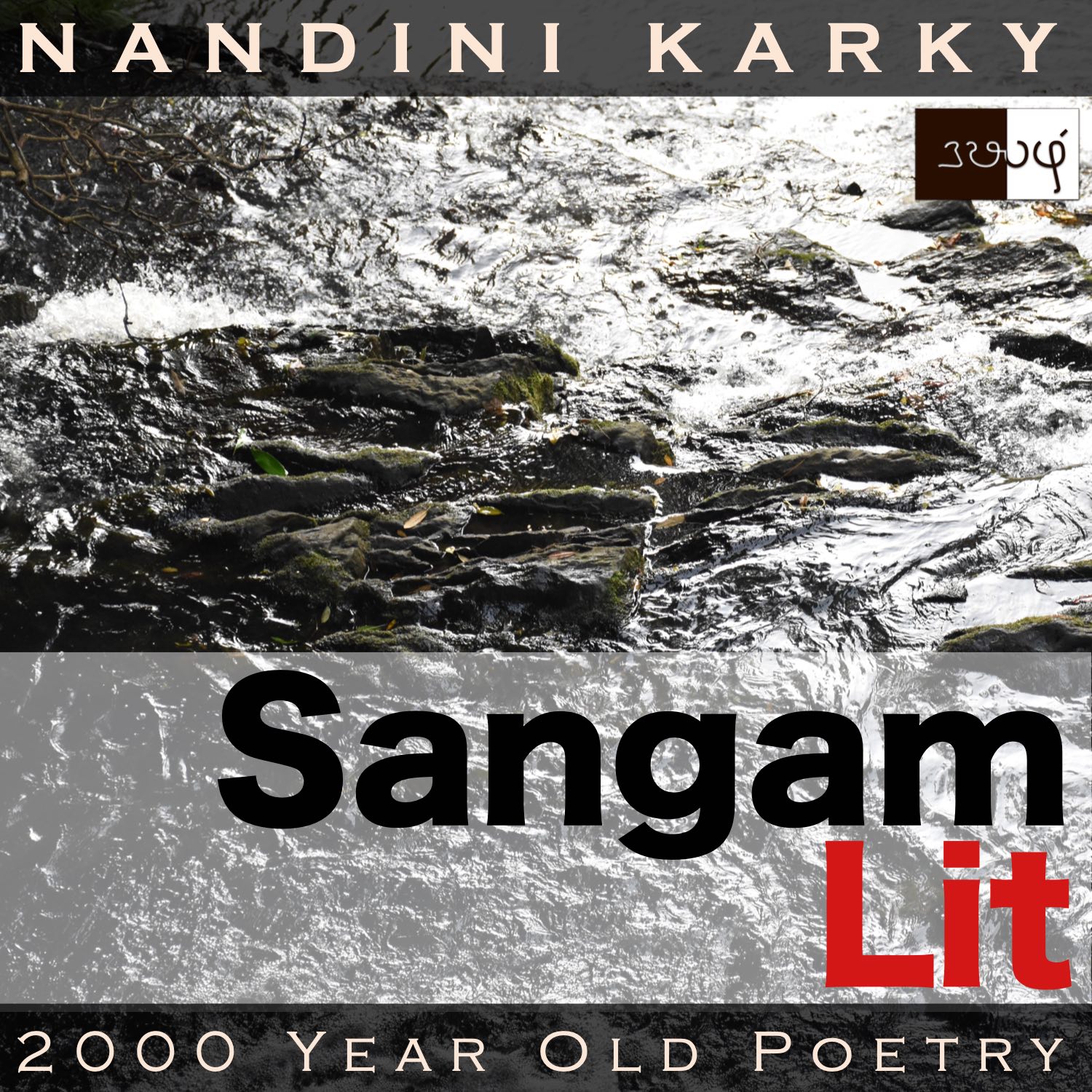Podcast: Play in new window | Download
Subscribe: Apple Podcasts | Spotify | Amazon Music | Android | iHeartRadio | TuneIn | RSS | More

In this episode, we relish the novel similes that paint the inner and outer world, as portrayed in Sangam Literary work, Natrinai 141, written by Salliyankumaranaar. The verse is set in the ‘Paalai’ region or the drylands and speaks in the voice of a man to his heart, expressing his inability to part from the lady and go in search of wealth.
இருஞ்சேறு ஆடிய கொடுங்கவுள் கயவாய்
மாரி யானையின் மருங்குல் தீண்டிப்,
பொரி அரை ஞெமிர்ந்த புழற் காய்க் கொன்றை,
நீடிய சடையோடு ஆடா மேனிக்
குன்று உறை தவசியர் போல, பல உடன்
என்றூழ் நீள் இடைப் பொற்பத் தோன்றும்
அருஞ்சுரம் எளிய மன், நினக்கே; பருந்து பட,
பாண்டிலொடு பொருத பல் பிணர்த் தடக் கை
ஏந்து கோட்டு யானை இசை வெங்கிள்ளி
வம்பு அணி உயர் கொடி அம்பர் சூழ்ந்த
அரிசில் அம் தண் அறல் அன்ன, இவள்
விரி ஒலி கூந்தல் விட்டு அமைகலனே.
The earth element pervades this song, opening with ‘இருஞ்சேறு’ meaning ‘black mud’ and ending with ‘தண் அறல்’ meaning ‘cool sands’. ‘கொடுங்கவுள்’ brings forth the ‘curved cheeks’ of the ‘மாரி யானை’ or ‘raincloud-like elephant’. There’s the ‘கொன்றை’ or ‘golden shower tree’ making its appearance with ‘புழற் காய்’ or ‘pipe-like fruit’. Another elephant is glimpsed at, in connection with a ‘Chola King Killi’ as represented by the phrase ‘இசை வெங்கிள்ளி’. ‘இசை’ refers not to ‘music’ as in contemporary language but is seen in the meaning of ‘fame’ here. We are also whisked away to an ancient Sangam town ‘அம்பர்’, where flows the ‘அரிசில்’ river, a tributary of Cauvery. Let’s walk along this river’s shore to see where the verse flows.
The man and woman have been in a married relationship and the man’s heart compels him to part with her in search of wealth. The man turns to his heart and says, “After bathing in black mud, with curved cheeks and big mouths, the cloud-like elephant dashes against the ‘kondrai’ tree, making the tree’s trunk lose its bark and look rough on the surface. With its long, hollow fruits hanging all around, the tree appears like the unwashed body of a mountain-dwelling ascetic with matted hair. Crossing the harsh drylands, where many such trees appear, seems an easy task for you, O heart! Making vultures swoop down, with chariots many, and elephants with rough trunks, and sharp tusks, the Chola King Killi, who desires fame, wages wars. And, in his town of Ambar, the newly woven flags always fly on high. Like the cool sands of the Arisil river flowing through this town, falls the wide, luxuriant tresses of my lady. I don’t have the strength to part from those tresses of lady mine!” With these words, the man expresses the pain he would feel in parting with his lady and bids his heart to go on that wealth-seeking journey alone!
Now, for the nuances that lie buried in the river sand here! The man opens with the image of an elephant bathing in mud. Reading a bit about the elephant’s love for playing in mud reveals some fascinating facts. There’s a Tamil proverb which goes ‘யானை தன் தலையில் தானே மண்னை வாரி இறைப்பதுப் போல்’ meaning ‘like an elephant dishevels its own head by pouring sand on it’, referring to the act of someone sullying their reputation by an ignorant act of theirs. However, there is nothing defiling about an elephant doing this. Turns out that the sand, the elephant smears all over its body after a bath, is its sunscreen. Why would the thick-skinned animal need any sunscreen? We learn that thick hides notwithstanding, the elephant’s skin is sensitive to heat and this is no ignorant act but a protective mechanism inherent in the elephant. The elephant in the poem, living in the drylands, no doubt necessitates a prominent such mud smearing! Then, there’s a subtle but exquisite simile in placing a raincloud and an elephant in parallel. A dark exterior with gentleness concealed within, in both the elements referenced! Why all this talk of the elephant? Only to say, with its mud-washed body, it scratches against the ‘kondrai’ tree, breaking its bark and leaving its trunk rough and exposed. The man then takes a step back and looks at this ‘kondrai’ tree, with long pipe-like fruits hanging all around. This brings the image of a ‘saadhu’ with long, matted hair and unwashed body, to his mind. He lets us know that these ascetics live in mountains, and engage in deep meditation, that they forego food, sleep, and grooming, and look the way they do. He places the ‘kondrai’ tree with its long, hanging fruits and rough trunks alongside these mountain-dwelling hermits with matted hair and we come away astonished by the aptness of the simile.
The man describes the elephant, ‘kondrai’ tree and the ‘saadhu’, only to say that the heart seems to have no qualms in traversing distant drylands with such trees many. He also establishes that his fear is not about the harsh paths in the way, but something else. That something else is brought into focus by referring to a Chola King ‘Killi’, who was desirous of fame and thus engaged in conquests to expand his kingdom. The man also talks about the king’s capital city of ‘Ambar’, where the flag of victory always fluttered on high and, through which flowed the river ‘Arisil’, which left behind the rich, black, alluvial soil, before emptying into the ocean. It’s this wavy, fine, black sand that the man compares the lady’s tresses and concludes that that this is what he does not have the heart to part from. With these picturesque similes, the man expresses to his heart, his difficulty in parting with the lady. At the same time, he could have used this indirect ploy of speaking to his heart to prepare the lady for his imminent journey. A poem that shows us that the imagination of those ancient poets was as fertile as the rich sand in their river delta!




Share your thoughts...